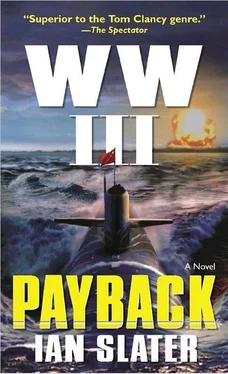Facial ID was impossible, the infrared cameras recording merely two “bleeds”—white thermal blobs on a grayish background. One figure, a tall individual, seemed to be wearing what looked like coveralls, like so many mechanics at both the civilian and military ends of the huge complex of runways. His ID badge, which he wore around his neck, was giving off a civilian employee’s IR dots, the same kind of stick-on, off-the-shelf IR dots as had been used by Freeman’s team. This told Homeland Security Agent Johnny Suzuki and FBI Agent Jenny Osaka that whoever it was holding the big IR binoculars and what appeared to be a small camera was almost certainly a spy who had guts, for there were random Humvee night patrols, especially after 9/11 and the triple hit against the airliners. But whoever it was also seemed to know the location of the invisible laser beam that would trigger alarms at the military airport’s headquarters, should they be trespassed.
The second intruder was a figure who was not bleeding IR radiation but was surprisingly cool and had recognizable Navy IR dots — probably one of the Navy SEALs from Pearl Harbor honing his “infiltration and exfiltration of enemy bases” techniques.
There seemed to be no doubt that the taller individual was the primary suspect, but neither Homeland Security’s Johnny Suzuki nor FBI’s Jenny Osaka could be 100 percent sure. When Johnny Suzuki, at Homeland Security headquarters in downtown Honolulu, did the computer search for all those registered in Honolulu and the rest of Oahu who either owned or had bought zoom IR binoculars and IR cameras, it took only three and a half minutes, something that would have astonished his Nisei great-uncle who had worked as a military policeman until he was interned during World War II.
Of the seventeen names that popped up on the computer, two were now deceased, three in old-age homes, and only one of the remaining twelve — information that Johnny had been able to acquire by using the man’s Social Security number given at the time of purchase of the binoculars — was over six feet tall. It was now easy to identify the man from the civilian airport’s photo ID security files. His name was Yudah Ulama, a Muslim of South Asian descent, originally from Indonesia, who had been granted U.S. citizenship in November 2004.
General Freeman, more used to tactical and strategic maneuvers than to counterespionage, nevertheless made what Aussie described as a “bloody good suggestion” to Homeland Security and the FBI — namely, to be a little lax, though nothing too obvious, regarding airport security on the return flight of the Galaxy, with the RS, again all-weather-wrapped and bearing the three bogus helo engine mounts, to Hawaii.
The plan worked, up to a point. That is, intel must have been passed from Yokohama, from where the Galaxy took off, to Hawaii, regarding the departure of the plane loaded with what seemed to be a triple-engine helo or boat in all-weather wrap. In any event, the intruder showed up again near the military/civilian airport perimeter, obviously trying to gather more information about the strange craft hidden under the wrap than he’d been able to garner when he’d first seen it being loaded aboard the Galaxy on its way to Japan.
But what could Homeland Security or the FBI arrest him for? Trespassing? Instead, they put the suspect under 24-7 surveillance. The next day, he worked a long, twelve-hour shift as a food dispenser in a small teriyaki/rice concession stand outside Honolulu’s domestic terminal, which would explain, as Jenny Osaka pointed out to Johnny Suzuki, why they had been unable to identify him inside either the international or domestic terminals.
For both Johnny and Jenny, the intruder and his teriyaki-stand cover seemed as good a connect as they were going to get. His religion and height — six feet, two-and-a-half inches — in a predominantly short population only added to their certainty. But he had still not met anyone, though both Homeland Security and the FBI now knew he had a darkroom in the small bungalow he rented in Chinatown, and must be developing the photos of the Galaxy and the RS. Besides this infraction of the Patriot Act, not registering his lab, he had not committed any more serious a crime than trespassing in a DoD-restricted area.
The break for Johnny Suzuki and Jenny Osaka came on the second day, when, on what was obviously his day off, the man, Yudah Ulama, took the beach bus to Hanauma Bay, where he left a can of Coke beneath a rock well back from the beach’s concession stand, after which he changed under cover of a beach towel and went swimming, joining the hundreds of others who were enjoying watching the myriad marine life in the crystal-clear waters of the horseshoe-shaped bay.
He had been gone no more than a minute before a young Japanese-American youth emerged from the water, went to the open showers, and quickly toweled himself down as he walked casually to the rock, retrieved the Coke can, and then mounted a mountain bike for the steep, hot ride up to Kalanianaole Highway.
The mountain biker, in his early twenties, rode to the post office a couple of miles away at Hawaii Kai, where he was arrested in the process of mailing a canister of film from the fake piggy-bank Coke can to a post-office box on the island of Kauai. Yudah Ulama was arrested as he was about to board the Waikiki-bound Beach Bus.
Johnny Suzuki and Jenny Osaka identified themselves to the postmaster at Hawaii Kai, and a quick computer search told them that the post-office box in Kauai was rented by a Tayama Omura, who, a concomitant computer search revealed, was now nearly ninety, living in an apartment block down above Brennecke’s Beach near Poipu on the southeastern end of the Garden Isle.
Jenny Osaka told Johnny Suzuki that it was kind of sad to have to arrest such an old man, but Johnny would have none of it. “Just like a woman,” he said, knowing it was clearly a blatant sexist remark. “I remember my grandma saying that they shouldn’t have hanged Tojo after the war because he was ‘getting on in years.’ You think those Nazis, those child torturers like Mengele, hiding down there in South America, shouldn’t have been taken out by the Israelis just because they were ‘getting on in years’?”
“I just think it’s sad,” responded Jenny. “I just think of a woman holding a baby in her arms. What happens?”
In a moment of unpleasant revelation, Johnny replied, “Look, my great-uncle was in Navy Intel here during the war, but he stepped over the line. When they were interning the Nisei after Pearl Harbor, he and an older black guy raped a young woman in the camp. He was demoted, and they put him in the stockade. This Omura, whoever he is, is old, but he’s probably been working against the U.S. for North Korea — and who knows who else? — for years. Probably cost a lot of our guys their lives.” Johnny pointed to the computer screen. “Says here he was interned during World War Two. And now we’ve got him as the owner of the post-office box in Kauai that would have received that dead drop at Hanauma Bay. He’s a ninety-year-old spy, Jenny.”
“I know,” she said.
When Tayama Omura, after doing his midday Tai Chi stretches, called his two stringer agents, twice, between the contact time of 3:00 and 4:00 P.M. and didn’t get a response, he assumed both had been arrested. One of the stringers, the mountain biker, might have been in a traffic accident — it was gridlock in Honolulu these days, which was why Tayama had moved to Kauai — but neither of them responding was a bad sign.
En route on the twenty-six-minute Aloha flight from Oahu to Kauai, Johnny Suzuki received a call on his cell from Honolulu headquarters. “Johnny, those two jokers we have in cells have both received calls on their home phones from the same number. We traced the calls back to the P.O. box guy in Kauai. Be careful.”
Читать дальше












